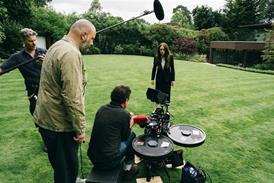A new three-day event is to be held in Locarno and Monte Verità before Easter 2013; competition titles find sales companies.
The Locarno Film Festival is to expand beyond its August dates with a new three-day event to be held in Locarno and Monte Verità before Easter 2013.
Speaking to Swiss national television, festival president Marco Solari [pictured] explained that the festival was in such good shape “organisationally and artistically that we can at last expand space and time-wise.”
The festival responded to a request from the Canton of Ticino’s Department of Education, Culture and Sport to create a ‘spin-off’ event, L’Immagine e la Parola (Image & Word), from March 21-24, 2013, as part of the new Primavera Locarnese initiative.
Image & Word will be curated by Locarno’s artistic director Olivier Père who intends to organise a programme of a dozen sessions “to explore the close links between film and literature, in terms of what ends up on screen and the creative process of film-making.”
Screenings will be held in the Teatro Kursaal, while discussions, presentations and other activities will be located at Monte Verità, which will be the venue for a second strand of Primavera Locarnese, entitled BorderLines, I giorni di Monte Verità (March 24-28), which has been conceived by former Locarno artistic director Irene Bignardi and Paolo Mauri.
Meanwhile, Switzerland’s new Culture Minister Alain Berset paid his first visit to Locarno in his new function and put an end to any further discussion about the creation of an independent national film institute to administer the Swiss national film funding programme.
Speaking to Der Sonntag newspaper, Berset said that this would be “a bad solution. An outsourcing would also be wrong politically. It is the political establishment who sets the parameters for film funding. Therefore, it is right that the film funding stays close to the politicians.”
At the same time, he argued that there was a need to maintain a dialogue with the authorities in Brussels in order to extend Swiss membership of the European Union’s MEDIA Programme past 2014.
Away from the weekend’s festival screenings and cocktail parties, there were high-level political meetings behind closed doors such as the ‘Diner Politique’ organised by the Swiss film industry where film director Lionel Baier implored national politicians to vote for an increase to the film funding budget; and the traditional ‘Diner républicain’ in Ascona attended by such political heavyweights as Culture Minister Berset, ex-German Chancellor Gerhard Schroeder, Swiss Federal President Eveline Widmer Schlumpf, Poland’s Prime Minister Donald Tusk, Martin Schulz, President of the European Parliament, and former European Central Bank president Jean-Claude Trichet.
The first festival weekend also provided a platform for the local industry to discuss the current state of Swiss cinema. Swiss Films’ managing director Micha Schiwow, distributor Michel Bühler and SRG SSR head of co-production Sven Wälti were among the participants of a roundtable to discuss the reasons why theatrical distribution of Swiss films in Switzerland is far from satisfactory. Locarno’s Industry Office chief Nadia Dresti proposed that a trade show for Swiss films be staged at the Solothurn Film Days in January to which exhibitors from key cities, including multiplexes should be invited.
Meanwhile, Alessandra Moresco of Geneva-based UniversCiné Switzerland unveiled the new Swiss VOD platform leKino.ch which is scheduled to go online in October and has been supported by MEDIA and the SSA Cultural Fund.
In addition, leKino.ch, which is a multi-lingual platform in German, French and English, has forged close working partnerships with La Cinémathèque Suisse, SSR, Solothurn Film Days, Visions du Réel, and the Locarno Film Festival.
By the end of the first weekend, another three of the International Competition titles had found a sales agent, leaving only seven to yet be picked up. Berlin-based M-Appeal is handling Julio Hernández Cordón’s Dust (Polvo), which will have its world premiere on Aug 10, while Films Boutique secured the international distribution rights for The Last Time I Saw Macau (A Última Vez Que Vi Macau), co-directed by Joao Rui Guerra da Mata and Joao Pedro Rodrigues, which has its premiere on Monday/today (Aug 6).
Moreover, Rai Trade Italy signed on to handle world sales for Edoardo Gabbriellini’s The Landlords (Padroni di Casa). The drama about two young brothers with ideas of making it big in the construction business had its premiere on Sunday (Aug 5) with lead actors Elio Germano, Valerio Mastandrea, Gianni Morandi and Valeria Bruni Tedeschi in attendance..
While the hotel situation has not improved in Locarno – the town has only three four-star hotels and most festival guests are put up in neighbouring Ascona or further afield – this year has seen the festival lose two venues popular for nightly networking: the Lido and La Suite.
Locarno’s Lido is currently undergoing renovation work, but the La Suite location was a victim, according to local reports, of the town council’s own greed and incompetence.
Commenting on the loss of these two venues in an interview with the weekly Tessiner Zeitung, Nadia Dresti said that the festival “needs two meeting places of this size with a certain class. Places where one can hold a cocktail party, where director Père can go with a prize-winner for a drink, where the sponsors can meet each other.”
Fortunately, she managed at short notice to find two alternative venues for this year: the Rinascente Loft in the old town and the Lido at Ascona.
“I am just hoping that we don’t have to find new solutions every year,” Dresti said.






















No comments yet